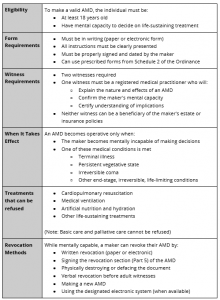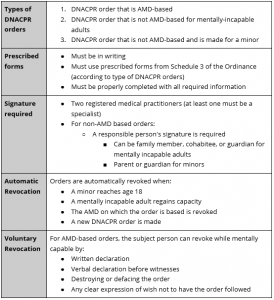In response to Hong Kong’s evolving healthcare needs amid an aging population, Hong Kong has enacted the Advance Decision on Life-sustaining Treatment Ordinance (the “Ordinance”). Passed by the Legislative Council on 20 November 2024 and gazetted on 29 November 2024, this legislation establishes a comprehensive framework for advanced healthcare decisions. The implementation includes an 18-month transition period, allowing medical institutions, relevant departments, and organizations to update their protocols and systems, and conduct necessary staff training. To support implementation, the Hong Kong Academy of Medicine will introduce practice guidelines in the first quarter of 2025.
At its core, the concept of Advance Medical Directives is fundamentally rooted in patients’ rights to self-determination and human dignity. While patients have the right to make informed healthcare decisions, including refusing treatment, several critical questions arise: primarily, how can they exercise this right when their decision-making capacity becomes impaired, and what effect should their previously expressed wishes have on subsequent medical decisions?
To address these challenges, the Ordinance introduces two key advance decision instruments that empower individuals to make informed choices about their future medical care: (i) Advance Medical Directives and (ii) Do-Not-Attempt Cardiopulmonary Resuscitation orders. The legislation is particularly significant because, prior to its enactment, determining the validity and applicability of Advance Medical Directives in certain circumstances often involved legal uncertainties, placing medical professionals and patients’ family members in challenging situations.
Here are some key takeaways:
Advance Medical Directives (“AMDs”)
What is an AMD?
An AMD enables individuals to specify in advance their wishes regarding life-sustaining treatments for situations where they become mentally incapable of making such decisions. These legally binding documents provide healthcare professionals with clear guidance while respecting patients’ autonomy.

What is a DNACPR Order?
A Do-Not-Attempt Cardiopulmonary Resuscitation order is a legal document that directs healthcare providers not to perform cardiopulmonary resuscitation when a person experiences cardiopulmonary arrest. This means if the person’s heart stops beating or they stop breathing, healthcare providers will not attempt: (i) Chest compressions; (ii) Artificial ventilation; and (iii) Defibrillation

Transitional Arrangement
To ensure a seamless transition to the new legal framework, the Ordinance includes comprehensive transitional provisions for existing advance care planning instruments. Under these provisions, pre-existing AMDs that comply with the Ordinance’s requirements will remain valid. Nevertheless, individuals are encouraged to review their existing directives and consider updating them using the newly prescribed forms. Similarly, for pre-existing DNACPR Orders, the Hospital Authority will facilitate their transition to align with the Ordinance’s forms before the commencement dates, thereby ensuring the continued effectiveness of all advance care planning instruments.
Important considerations
The Ordinance marks a significant advancement in Hong Kong’s healthcare landscape, providing residents with greater autonomy over their end-of-life care while ensuring clear guidance for healthcare providers. When considering these advance decision instruments, individuals are recommend to:
By following these recommended steps, individuals can ensure that their advance decisions accurately reflect their wishes and can be effectively implemented when needed.
Access the full Ordinance here for more details.